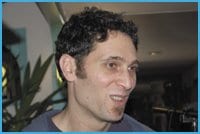“It was like looking into another world.” As a child in Montreal, Joe Balass was captivated by his family’s old photo albums of life in Iraq. “I grew up in Montreal and had very limited memories of Iraq. Flipping through the albums I tried to reconnect with a past that was so intangible.
“There was shock, too: How the hell did we end up in this situation?”
Balass was only four when his family fled Iraq, eventually sett-ling in Canada. Reconnecting with his Arab Jewish heritage has been an ongoing project for the gay filmmaker (whose previous films include Nana, George and Me). His new film Baghdad Twist, screening at the Toronto International Film Festival, was inspired by a home movie from 1965 of his family dancing The Twist at a wedding in Baghdad. Dapper young men in suits and thin ties dance with pretty young women in stylish silk dresses shown in saturated Super 8 colour. “When I came across the home movies, that was a whole other layer of connection. The dancing really made a connection between the Arab world and the western world.”
Moving and intelligent, Baghdad Twist is structured as a dialogue between Balass and his mother, Valentine, that runs over an amazing assortment of family photos, home movies, archival footage and propaganda news reels. Iraq is seen as both exotic and modern, its sun and colour juxtaposed against intentionally grim scenes of Montreal in winter. Beginning with Valentine’s idyllic childhood in a house on the river in Baghdad, the half-hour NFB doc tells the story of how life became increasingly difficult for her and Jewish Arabs after World War II.
With a history in Iraq stretching back more than 2,500 years, the Jewish community was around 170,00 strong in 1948; most left soon after the creation of Israel that year. But Balass’s family stayed, weathering increasing anti-Semitism and state-sanctioned repression. After her husband’s repeated arrests and the execution of more and more Jews, Valentine and her family fled the country in 1970. There are virtually no Jews left in Iraq today.
In Baghdad Twist there is a gentle, loving tug-of-war between Balass and his mother. His purposes in remembering are not her purposes. “The film is about memory and the transmission of identity,” says Balass. “The faults between generations — sometimes we meet and others we don’t.
“Most immigrants feel the unsteady ground that shifts between generations.
“The stories and memories passed down to the children are always filtered by a different kind of education. We are part of the stories and part of something else.”
In conversation Valentine Balass, who we never see in the present-day, comes across as tough, matter-of-fact, loving. In many of the old photos, she is shown to be an astonishingly beautiful young woman. In one section we hear her state emphatically, “I was an Iraqi and a Jew; the two always went together.” In another, we hear how her mother encouraged Valentine to stand up for herself against four brothers so that no man would push her around.
“Another aspect of the film is that I wanted to discuss the emancipation of women in Iraq — though those gains have now been wiped out. How women went from cogs in a patriarchal society to someone, in my mother’s case, who took charge and saved the family. She went from being cloistered behind the wall to talking to the chief of police. She made the decision to leave the country and save the family.
“My mother is a very special woman: After all is said and done this film is to honour her and her strength, charm and beauty.
In previous works like Nana, George and Me, Balass has been explicit in connecting how identities like Jewish and gay are perceived, hidden and transmitted. In Baghdad Twist, you have to look closely for Balass’s gayness. I suggest the evidence is in his celebration of his mother’s beauty. “It is a gay thing,” Balass agrees. “We are more sensitive to beauty: We seek it out and honour it.”
After watching the film Balass’s mother was initially surprised that there was no current film footage of her. In explaining the absence Balass says, “I wanted to make the film more universal. It’s too easy to talk about where we are today and ignore the past. When you piece together the old photos, they don’t always add up to today.”
Ultimately his mother was pleased with the results. “She’s happy about how she came across,” says Balass. “She was surprised at times by what I chose to accent, the archival images from Iraq that I used. And she got very emotional at times, more than she expected — so that was very emotional for me — the images of her as a child in her house near the river and later, the difficult times when my father was imprisoned.”
When discussing the film Balass keeps returning to the question of how identities are both inherited and chosen. “It’s an Arab film; it’s the story of an Arab exile. Gay people have to reappropriate aspects of our identity. As an Arab and a Jew, I have to underline how these are both parts of my identity.
“I want people to see this film as a universal story.
“I believe in bridge building,” says Balass, “of bringing together things that you might not expect should come together. I am an Arab filmmaker, even if I’m a Jew. That’s not incompatible.
“I want to foster a sense of open-mindedness; I don’t want to make something accusatory, placing people on opposite sides… I guess that’s a Canadian attitude.”
There’s one sequence in the film where a British news reel of life in Iraq in the ’50s naively intones about the march of progressive Western values among the women of Iraq, that western dress and attitudes were taking over. “We are consistently duped and fooled by propaganda,” says Balass, “in that case the idea of progress. But there’s anti-Semitic propaganda, homophobic propaganda. How to navigate that minefield of misinformation is something we constantly have to learn how to do.”


 Why you can trust Xtra
Why you can trust Xtra


